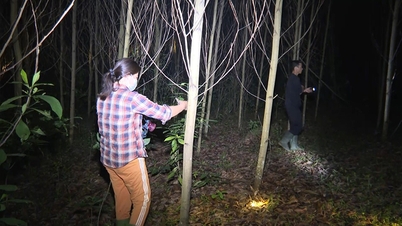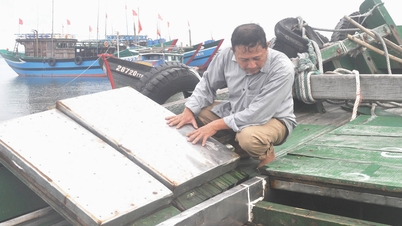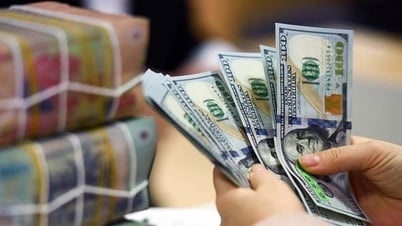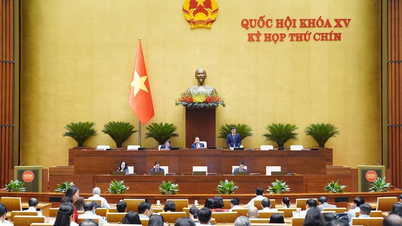Many investors participating in high-value transactions have "fallen into the trap" of super profits due to lack of knowledge about finance, currency, digital technology... This reality poses significant challenges in state management of virtual currency.
First article: "Empty-handed" because of virtual profits
Vietnam currently has no virtual currency exchange that is recognized and legally operating by the State, nor does it recognize virtual currency as a means of payment. However, on many social networking platforms, virtual currency continues to "circus", causing a series of investors to "lose everything".
Many virtual currencies are created by organizations and individuals themselves and are covered with beautiful words about market capitalization, development potential and high profits... which are increasing fraud cases, causing great consequences for society.
“Traps” in cyberspace
It is not difficult to find attractive promotional content about virtual currency and cryptocurrency on social networks, such as: "Interlink network - an American project in collaboration with billionaire Elon Musk: This deal has just been launched, with great potential, be the first to take the lead...". Or "Interlink network is a hot project right now. The app is number one in Canada. While waiting for Pi to reach the new peak, we can download and install it to receive a huge airdrop for the first pioneers. Don't miss the opportunity to increase your income in the future!"...
People who are not knowledgeable about finance, currency, and digital technology will easily believe in "traps" and spend money to invest in virtual currency to "change their lives". However, in reality, many people are vague and do not fully appreciate the nature of those invitations.

In fact, since 2013, Bitcoin virtual currency began to enter Vietnam, followed by the presence of a series of other virtual currencies, such as: Ethereum (ETH), Tether (USDT), Binance Coin (BNB)..., attracting people to be interested and participate in investing because of the attractive advertising about the profits gained from the increase in the price of these currencies when investing.
Underground trading, investment, trading of virtual currency, and capital mobilization through initial coin offerings (ICOs) are quite active, especially the use of virtual currency to mobilize capital through multi-level marketing methods that are becoming increasingly complex.
Taking advantage of a segment of the population lacking knowledge about technology, banking, digital finance, etc., many people have "hunted" rich people, the elderly, people who are greedy for profit, etc., luring them into the "game". With a clever approach, capturing the psychology of participants, many people are fascinated by the huge profits promised to be earned in a short time when investing in virtual currency.
Many people have gone bankrupt when investing in virtual currency. For example, Mr. H (in Hanoi), after making friends via Zalo and Telegram, was invited by the account "Angela Phuong" to invest in virtual currency via the website decexswap.com, then changed the domain name to fiatlesscoin.com. After participating for a while and withdrawing a profit of 300 million VND, Mr. H continued to invest... But when the investment amount reached nearly 30 billion VND and he could not withdraw the profit, Mr. H realized he had been scammed.
Similarly, about 100 businesses and nearly 400 individuals bought virtual currency called QFS with a total value of up to tens of billions of VND because they believed they would "reap" high profits when trading through internal exchanges.
Through reconnaissance, the authorities discovered that Ho Quoc Than - General Director of Trieu Nu Cuoi Joint Stock Company (An Khanh Commune, Hoai Duc District, Hanoi) had committed fraud by providing false information about QFS money. In early March, the Investigation Security Agency, Hanoi City Police initiated a case, prosecuted the accused, and temporarily detained Ho Quoc Than to investigate the crimes of "Fraudulent appropriation of property" and "Possession of counterfeit money".
Signs of a scam
The above are just typical examples of investors falling into the "trap" of virtual currency. Criminal gangs take advantage of the pervasive nature of information on cyberspace, offering attractive advertisements and offers about interest rates, commissions, etc., in order to appeal to investors' greed. Meanwhile, the cyber environment has the ability to erase traces and is highly "anonymous", so investors do not know where businesses are calling for capital, what they are doing to create a source of money to pay such high profits to investors...
Investing in virtual currency through websites, applications, and virtual currency exchanges poses many risks for investors because in Vietnam, there is no virtual currency exchange recognized by the State and operating legally. On the other hand, virtual currency is not recognized by Vietnamese law as an asset, not a means of payment. Hanoi City Police have continuously warned and provided information for people to identify fraudulent behavior.
The Department of Information Security (Ministry of Information and Communications - now the Ministry of Science and Technology) also pointed out a number of methods and tricks of fraud related to financial investment, virtual currency, and cryptocurrency. Common forms of fraud are multi-level marketing of virtual currency and cryptocurrency disguised on cyberspace to appropriate assets, fraud through the activities of foreign exchange trading floors, etc.
Faced with the increasing "heat" of scams related to virtual currency, many forums and seminars have been organized to identify criminal acts. At the seminar on preventing and combating financial crimes in cyberspace (organized by Ho Chi Minh City Police in coordination with the Vietnam Blockchain Association (VBA) at the end of December 2024), delegates commented that more and more subjects are appearing to create valueless digital currencies, create communities for exchange, create "bait" to attract and defraud players. These people also regularly organize events, send "partners" abroad to "paint" and attack the trust of participants...
Looking at the current state of virtual currency scams, some officers directly working on crime investigations analyzed that there are 3 main signs to recognize scams.
The first is illegal fundraising. Accordingly, those who want to invest must pay a certain amount of money under many different names and forms. The projects or products offered are essentially just a cover, an excuse to cover up fundraising activities.
Second , the transaction operates based on deception: Always providing false information about the benefits of investing, especially false propaganda about income, bonuses, profits, commissions that those who are or will invest will enjoy, or "painting" the prospect of wealth, doing nothing but still having high income.
Third , participants will be paid for attracting other participants to invest. The commission and bonus paid to investors is the reward for attracting new investors. This amount is partly deducted from the income of the new lower-level participants. The nature of this behavior is still to take money from the later participants to pay the earlier participants, the upper-level in the network. When there are no more people paying, the system will immediately collapse and participants will lose their investment money.
Because many people lack knowledge about virtual currency, despite warnings from authorities, traps continue to open up and the number of investors who become victims continues to increase.
(To be continued)
Source: https://hanoimoi.vn/quan-ly-tien-ao-thach-thuc-trong-thoi-dai-cong-nghe-so-698522.html




![[Photo] General Secretary To Lam concludes visit to Russia, departs for Belarus](https://vphoto.vietnam.vn/thumb/1200x675/vietnam/resource/IMAGE/2025/5/11/0acf1081a95e4b1d9886c67fdafd95ed)
![[Photo] General Secretary To Lam arrives in Minsk, begins state visit to Belarus](https://vphoto.vietnam.vn/thumb/1200x675/vietnam/resource/IMAGE/2025/5/11/76602f587468437f8b5b7104495f444d)

![[Photo] General Secretary To Lam meets and expresses gratitude to Vietnam's Belarusian friends](https://vphoto.vietnam.vn/thumb/1200x675/vietnam/resource/IMAGE/2025/5/11/c515ee2054c54a87aa8a7cb520f2fa6e)
















![[Photo] National Assembly Chairman Tran Thanh Man attends the Party Congress of the Committee for Culture and Social Affairs](https://vphoto.vietnam.vn/thumb/1200x675/vietnam/resource/IMAGE/2025/5/11/f5ed02beb9404bca998a08b34ef255a6)































































Comment (0)